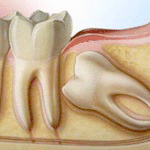
Misaligned wisdom teeth present a potential problem. They may grow horizontally or may be angled towards second molars or away from them. This can entail impaction or damage of adjacent teeth, the whole jaw or nerves. If a wisdom tooth is too close to the second molar, a risk of fouling and dental plaque on the second molar increases considerably. Besides, wisdom teeth can be enclosed within the jawbone and/or the soft tissue, or only partially break. Partially erupted third molar allows bacteria to enter an opening in the soft tissue and proliferate around the tooth. As a result, an infection is caused. It may be accompanied by symptoms such as pain, swelling, inflammation, jaw stiffness, and general illness. It can result in displacement of the permanent tooth and malocclusion. In this case urgent surgical treatment is indicated. Wisdom teeth are most prone to tooth decay and gum disease because their hard-to-reach location makes brushing and flossing difficult.
As a rule, it is recommended to have an upper wisdom tooth extracted, as it is hard to treat because of its hard-to-reach location, while its absence has no adverse effects, moreover, it practically excludes overcrowding of teeth, which may cause gum diseases.
There are difficult cases when a dental surgeon has to remove a bone fragment, which complicates the work, but an experienced dentist is sure to cope with all difficulties.
Your dentist may recommend you a preventative extraction of the wisdom tooth, i.e. you can solve problems before they happen. Experience has proven that it is the best solution, as removal of the damaged wisdom tooth is much more painful. It is worth mentioning that there are no distinct age criteria for wisdom teeth extraction. But it is better to have wisdom teeth removed in adolescence, as the sooner one gets them extracted, the smaller a risk of complications in post-extraction period is. Secondly, the younger the patient is, the easier different surgical interventions are endured, the shorter tissue healing time after extraction tends to be. And thirdly, it is obvious that if the wisdom teeth roots are not fully developed and the bone tissue is less dense, their extraction is less traumatic.
Wisdom tooth extraction is inevitable if the tooth:
- has not erupted and causes discomfort;
- causes jawbone inflammation;
- has partially erupted, which results in gingival crevice;
- is inclined and stuck against the root of the seventh tooth;
- is badly damaged by caries;
- et cetera.
As a rule, a recovery speed after wisdom tooth extraction depends on the surgical procedure. In our dental office you can have your wisdom teeth extracted at a high level of expertise and absolutely painlessly.



